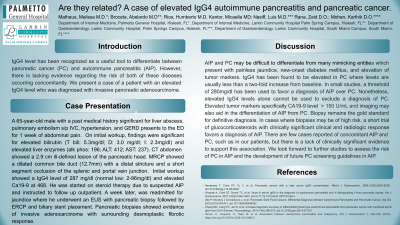Back


Poster Session C - Monday Afternoon
Category: Biliary/Pancreas
C0066 - Are They Related? A Case of Elevated IgG4 Autoimmune Pancreatitis and Pancreatic Cancer
Monday, October 24, 2022
3:00 PM – 5:00 PM ET
Location: Crown Ballroom

Has Audio

Melissa Matheus, MD
Palmetto General Hospital
Hialeah, FL
Presenting Author(s)
Melissa Matheus, MD1, Abelardo Broceta, MD2, Humberto Rios, MD3, Micaella Kantor, MD3, Luis Nasiff, MD3, Rana Zaid, DO2, Emmanuel McDonald, DO2, Karthik Mohan, DO1
1Palmetto General Hospital, Hialeah, FL; 2Larkin Community Hospital, South Miami, FL; 3Larkin Community Hospital, Hialeah, FL
Introduction: IgG4 level has been recognized as a useful tool to differentiate between pancreatic cancer (PC) and autoimmune pancreatitis (AIP). However, there is lacking evidence regarding the risk of both of these diseases occurring concomitantly. We present a case of a patient with an elevated IgG4 level who was diagnosed with invasive pancreatic adenocarcinoma.
Case Description/Methods: A 65-year-old male with a past medical history significant for liver abscess, pulmonary embolism s/p IVC, hypertension, and GERD presents to the ED for 1 week of abdominal pain. On initial workup, findings were significant for elevated bilirubin (T bili: 5.3mg/dl; D: 3.0 mg/dl; I: 2.3mg/dl) and elevated liver enzymes (alk phos: 196; ALT: 412; AST: 237). CT abdomen showed a 2.9 cm ill-defined lesion of the pancreatic head. MRCP showed a dilated common bile duct (12.7mm) with a distal stricture and a short segment occlusion of the splenic and portal vein junction. Initial workup showed a IgG4 level of 287 mg/dl (normal low: 2-96mg/dl) and elevated Ca19-9 at 468. He was started on steroid therapy due to suspected AIP and instructed to follow up outpatient. A week later, was readmitted for jaundice where he underwent an EUS with pancreatic biopsy followed by ERCP and biliary stent placement. Pancreatic biopsies showed evidence of invasive adenocarcinoma with surrounding desmoplastic fibrotic response.
Discussion: AIP and PC may be difficult to differentiate from many mimicking entities which present with painless jaundice, new-onset diabetes mellitus, and elevation of tumor markers. IgG4 has been found to be elevated in PC where levels are usually less than a two-fold increase from baseline. In small studies, a threshold of 280mg/dl has been used to favor a diagnosis of AIP over PC. Nonetheless, elevated IgG4 levels alone cannot be used to exclude a diagnosis of PC. Elevated tumor markers specifically CA19-9 level > 150 U/mL and imaging may also aid in the differentiation of AIP from PC. Biopsy remains the gold standard for definitive diagnosis. In cases where biopsies may be of high risk a short trial of glucocorticosteroids with clinically significant clinical and radiologic response favors a diagnosis of AIP. There are few cases reported of concomitant AIP and PC, such as in our patients, but there is a lack of clinically significant evidence to support this association. We look forward to further studies to assess the risk of PC in AIP and development of future PC screening guidelines in AIP.
Disclosures:
Melissa Matheus, MD1, Abelardo Broceta, MD2, Humberto Rios, MD3, Micaella Kantor, MD3, Luis Nasiff, MD3, Rana Zaid, DO2, Emmanuel McDonald, DO2, Karthik Mohan, DO1. C0066 - Are They Related? A Case of Elevated IgG4 Autoimmune Pancreatitis and Pancreatic Cancer, ACG 2022 Annual Scientific Meeting Abstracts. Charlotte, NC: American College of Gastroenterology.
1Palmetto General Hospital, Hialeah, FL; 2Larkin Community Hospital, South Miami, FL; 3Larkin Community Hospital, Hialeah, FL
Introduction: IgG4 level has been recognized as a useful tool to differentiate between pancreatic cancer (PC) and autoimmune pancreatitis (AIP). However, there is lacking evidence regarding the risk of both of these diseases occurring concomitantly. We present a case of a patient with an elevated IgG4 level who was diagnosed with invasive pancreatic adenocarcinoma.
Case Description/Methods: A 65-year-old male with a past medical history significant for liver abscess, pulmonary embolism s/p IVC, hypertension, and GERD presents to the ED for 1 week of abdominal pain. On initial workup, findings were significant for elevated bilirubin (T bili: 5.3mg/dl; D: 3.0 mg/dl; I: 2.3mg/dl) and elevated liver enzymes (alk phos: 196; ALT: 412; AST: 237). CT abdomen showed a 2.9 cm ill-defined lesion of the pancreatic head. MRCP showed a dilated common bile duct (12.7mm) with a distal stricture and a short segment occlusion of the splenic and portal vein junction. Initial workup showed a IgG4 level of 287 mg/dl (normal low: 2-96mg/dl) and elevated Ca19-9 at 468. He was started on steroid therapy due to suspected AIP and instructed to follow up outpatient. A week later, was readmitted for jaundice where he underwent an EUS with pancreatic biopsy followed by ERCP and biliary stent placement. Pancreatic biopsies showed evidence of invasive adenocarcinoma with surrounding desmoplastic fibrotic response.
Discussion: AIP and PC may be difficult to differentiate from many mimicking entities which present with painless jaundice, new-onset diabetes mellitus, and elevation of tumor markers. IgG4 has been found to be elevated in PC where levels are usually less than a two-fold increase from baseline. In small studies, a threshold of 280mg/dl has been used to favor a diagnosis of AIP over PC. Nonetheless, elevated IgG4 levels alone cannot be used to exclude a diagnosis of PC. Elevated tumor markers specifically CA19-9 level > 150 U/mL and imaging may also aid in the differentiation of AIP from PC. Biopsy remains the gold standard for definitive diagnosis. In cases where biopsies may be of high risk a short trial of glucocorticosteroids with clinically significant clinical and radiologic response favors a diagnosis of AIP. There are few cases reported of concomitant AIP and PC, such as in our patients, but there is a lack of clinically significant evidence to support this association. We look forward to further studies to assess the risk of PC in AIP and development of future PC screening guidelines in AIP.
Disclosures:
Melissa Matheus indicated no relevant financial relationships.
Abelardo Broceta indicated no relevant financial relationships.
Humberto Rios indicated no relevant financial relationships.
Micaella Kantor indicated no relevant financial relationships.
Luis Nasiff indicated no relevant financial relationships.
Rana Zaid indicated no relevant financial relationships.
Emmanuel McDonald indicated no relevant financial relationships.
Karthik Mohan indicated no relevant financial relationships.
Melissa Matheus, MD1, Abelardo Broceta, MD2, Humberto Rios, MD3, Micaella Kantor, MD3, Luis Nasiff, MD3, Rana Zaid, DO2, Emmanuel McDonald, DO2, Karthik Mohan, DO1. C0066 - Are They Related? A Case of Elevated IgG4 Autoimmune Pancreatitis and Pancreatic Cancer, ACG 2022 Annual Scientific Meeting Abstracts. Charlotte, NC: American College of Gastroenterology.
